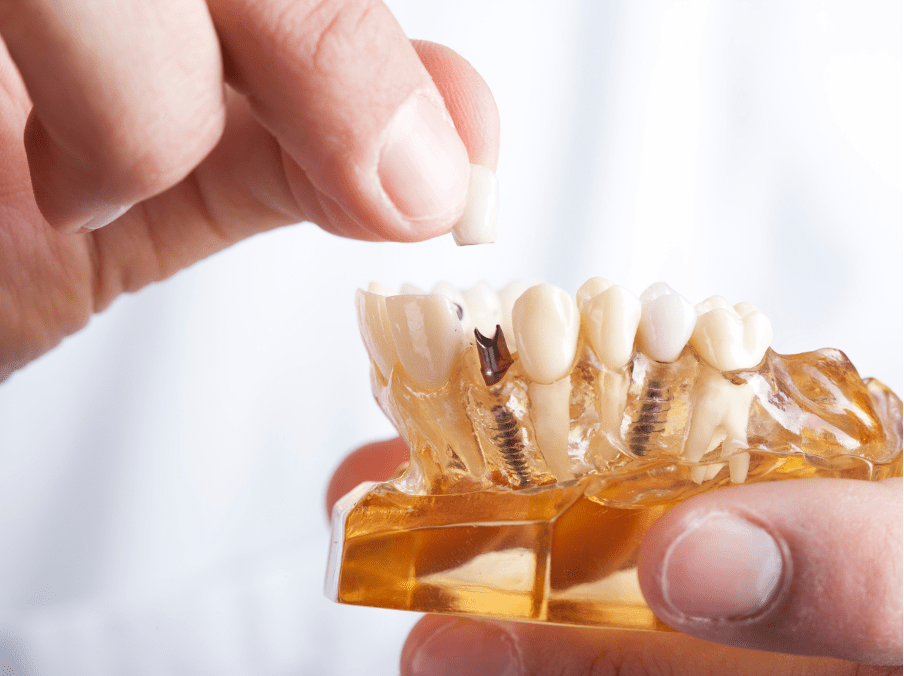
Full mouth dental implants are painless and comfortable alternatives to dentures. They are helpful in many situations, like replacing missing teeth caused by gum problems, chronic teeth grinding, or extensive tooth decay. It can dramatically change people’s lives and improve their quality of life by restoring their self-esteem and allowing them to eat well and socialize. Here, please note that How dental implants surgery is performed depends on the implant type and your jawbone condition. Dental implant surgery may involve several procedures.
What Are Full Dental Implants?
Full dental implants replace lost natural teeth or roots. Dentists use four implant points to place full dental implants, ensuring a long-lasting, complete-arch restoration. These help keep implants in place for extended periods than bridges or dentures.
Most dental implants are made of titanium, which has the unique ability to fuse with living bones and tissues. This will provide a solid foundation for your new teeth.
Full mouth dental implants are not the same as having individual dental implants. Instead of placing individual implants for every replacement tooth, full mouth dental implants use four implants in the upper and lower jaw that support a set of teeth.
This procedure can restore full-mouth function in patients who have lost all or most of their teeth. They are irreversible, prevent further bone loss, effectively maintain a facial structure, and improve oral health..
Types of Full Mouth Dental Implants
Here are the main restoration options for full-mouth dental implants, according to a dentist in Treasure Island FL:
1. Zirconia Full Arch
Zirconia, or zirconium dioxides, is a new dental and medical material. It is a durable, biocompatible metal similar to titanium but with a porcelain ceramic color. This is an excellent option if you want a natural-looking and long-lasting smile.
2. Implant-supported Dentures
Dentures can feel uncomfortable because they may feel loose. Implant-supported dentures are different; they are attached to dental implants and offer better support than traditional dentures. They are also cheaper.
One downside to implant-supported dentures is that they require frequent maintenance because they have a looser fit than other full-dental implants.
3. All-on-Four
This dental implant type uses four implants placed in your gums. All-On-Four implants are permanently attached to your jaw and act more like natural teeth in terms of function and aesthetics.
How Are Full Mouth Implants Placed?
You can choose one of these three primary tooth materials: zirconia, acrylic, or resin. Each material has unique properties, so make sure you discuss your options with an oral surgeon and implant specialist before making any decisions about full-mouth dental implants.
You may need a bone graft to prepare your jaw for implant placement. Your dentist will schedule your implant placement after you heal from the surgery.
Your dentist may remove any remaining teeth on the day of surgery before they attach four dental implants at the correct angle and position.
Before they place the teeth replacements, your dentist will properly position each implant screw into the jawbone. Then, they will secure dentures, bridges, or crowns onto the implants after they place the four abutments they need to secure the teeth replacements to your jaw.
Can You Get a Full Mouth of Implants?
People who have lost their teeth along the dental ridge of their mouth are the best candidates for full-mouth dental implants. Candidates should also be in good physical and mental health since this type of dental implant requires minor surgeries.
Prospective patients should have a healthy jawbone structure with enough natural bone and gum tissue to support and anchor dental implants. They should also be committed to good oral hygiene during the treatment plan.
Patients must be in good oral health for faster healing. Your dentist will need to inspect your mouth and take your full medical history before they proceed with implants.
How Much Do Full Mouth Dental Implants Cost?
Full mouth dental implants cost approximately $12,000 to $25,000 per jaw. This is lower than traditional implants, which can run $40,000 per tooth.
The following three factors are important in determining the cost of dental implants:
Your location: Differences in living costs can impact how much implants cost. For example, the West Coast has a higher cost of living than many East Coast regions. This will make dental implants more expensive on the West Coast. Additionally, full-dental implants in cities are more costly than in suburbs and smaller towns.
Materials: Dentists have the option to use various materials to make implants. The material you choose will affect your implant’s cost.
Dentist’s Level of Experience: Seasoned or experienced dentists can charge more than newer dentists.
Full-mouth dental implants are more expensive than other types. Patients may use their insurance plans to cover up to half the cost of major restorative procedures, including dental implants.
Key Takeaway
Full mouth dental implants are best for people who have lost all their teeth. It helps restore full mouth function, which helps patients eat better, communicate better, and improve their quality of life.
Patients can choose from different full dental implant types. After they choose, dentists will begin the process of placing implants. Implant candidates need to be in peak health and committed to good oral hygiene. They also need to have enough jawbone structure to support the implants.
Full mouth implant costs may vary depending on various factors like your dentist’s level of experience, the materials they use, and your location. Dental insurance can help cover the cost of implants.
Hey welcome to my blog . I am a modern women who love to share any tips on lifestyle, health, travel. Hope you join me in this journey!

Speak Your Mind